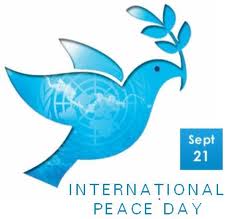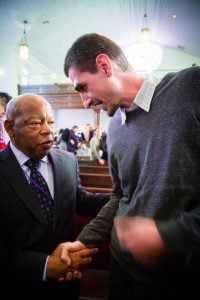 For International Day of Peace at the public Montessori school my son attends, we had a peace parade this morning. Black, white, and brown kids followed a peace dove puppet down the street to a public park and sang songs about peace on earth. They bowed to one another, in Asian fashion, and pledged to recognize the force for peace in one another. It was a heart warming site on a beautiful fall morning.
For International Day of Peace at the public Montessori school my son attends, we had a peace parade this morning. Black, white, and brown kids followed a peace dove puppet down the street to a public park and sang songs about peace on earth. They bowed to one another, in Asian fashion, and pledged to recognize the force for peace in one another. It was a heart warming site on a beautiful fall morning.
I watched much of this from the swing set where Leah and I stood pushing Nora, beside a mom who just happened to have walked her daughter to the park. A young, African-American woman, she noted the language of the peace pledge and said it sounded like what she remembered from church growing up, only without the God language. “I mean, I don’t mean to get religious or anything,” she said, “but I think that stuff is true.”
Indeed. But on International Peace Day, it’s hard for us in the West today to see how any of that stuff connects to Jesus and his church. On the play ground this morning, a post-Christian neighbor helped me to see that the biggest obstacle the church faces may be our history of resisting Christ’s peace.
We have too easily trusted the power of violence over the power of God. Because we have, it’s hard for someone to see how Jesus is behind, in, and throughout International Peace Day or any effort towards peace on earth and good will toward people, for that matter.
Part of repentance is learning to tell the truth about who we really are.
When Christians gained considerable worldly power, first in the Roman Empire and subsequently in other kingdoms and nation-states, Jesus’ peculiar way of nonviolent love seemed less realistic and, to a growing number of believers, irresponsible. How can any authority both establish the rule of law and turn the other cheek? What decent person who had the power to stop a Hitler would not kill a tyrant to save a whole people? Still, as necessary as violence seemed to many Christians, the conviction that Jesus inaugurated a new era in human history has always meant that Christians have a problem with war. In order to name when war is unjust, and thus not permissible for any Christian, the church developed criteria for a “just war.”
In considerations of the Christian tradition on war and peace, just war is often presented as the majority position over and against the minority stance of pacifism or Christian nonviolence. Such a presentation of church history, however, does not recognize the fact that just war teaching always limited violence to adult men in police or military units. This actually excluded the vast majority of Christians from the use of violence, simply by virtue of their being women, children, clergy, monastics, or everyday citizens not engaged in a just war or police action. What is more, it was assumed for most of the church’s history that participation in acts of violence—even acts deemed ‘just’—was a concession to the ways of the world that no doubt led Christians to sin. The church made provision for repentance and reconciliation—not celebration—when soldiers came home from battle. Even when war seems inevitable, our hope is not in military victory but in the reconciliation of all things through Jesus Christ.
When God’s people hold onto the hope of reconciliation through the peculiar way of the cross, we interrupt the assumptions of a culture of violence. But the truth is that all of us—not just soldiers and police officers—are well practiced in the use of worldly power. Those of us who come from positions of privilege in society lean on the silent power of money and social norms, trusting in systems of control that have favored people who speak our language or share our skin color. At the same time, people who live with their backs against the wall resort to subversive acts of violence, carving out a space for survival by manipulating the fears those who seem to be ‘in control.’ We can see these dynamics at work in local and international political negotiations. And, if we pay attention, we can see the same habits worked out between husbands and wives, parents and children, bosses and co-workers, pastors and congregations.
In the world that is passing away, violence rules. But in the new world that has already begun, Jesus shows us a better way.
In the midst of a ‘war on terror,’ when soldiers are often celebrated as heroes in churches, it can be difficult for anyone—especially American Christians—to remember why we would rather die than kill. But to forget the peculiar witness of Jesus and the martyrs is to forget the ‘new thing’ that the New Testament celebrates as the unique sign of Christ’s resurrection power.
Because Christ is risen from the dead, a people exists that does not live by the power of violence. The church calls those who chose to die rather than kill ‘martyrs’ because they show us the power of Christ’s nonviolent love. We remember these saints as a way of reminding ourselves that no power deserves our allegiance more than the One who raised Jesus from the dead. No way is more trustworthy than the way of nonviolent love.















